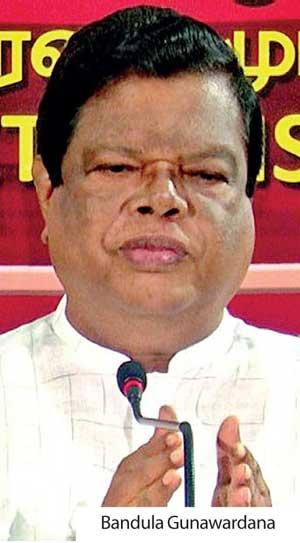Reply To:
Name - Reply Comment
By Nishel Fernando
For the first time in the country’s history,the government yesterday announced that salaries to public sector employees may get delayed up to one week as the Treasury struggles to manage public finances without resorting to monetary financing, which is loosely known as money printing.
The Cabinet Spokesperson and Minister of Transport and Highways and Minister of Mass Media Bandula Gunawardana yesterday revealed that the Cabinet of Ministers agreed to pay State employee salaries in two stages.
Accordingly, he noted that salaries to non-executive staff will be made on time while salary payments for executive staff may get delayed up to one week.
Similarly, the pension payments for retired State employees may also get delayed by a couple of days.
Last week, the government announced that Samurdhi payments for low-income households would likely to face delays amid the current crisis.
Gunawardana pointed out that the current State revenue is not even sufficient to meet essential recurrent expenditures, excluding interest payments.
“In December last year, the total State revenue amounted to Rs.141 billion, but our recurrent expenditures stood at Rs.154 billion excluding government interest payments of Rs. 182 billion,” he said.
The government incurred Rs.88 billion on salary payments followed by Rs.30 billion on pensions and Samurdhi, Rs.8.7 billion on medicine and Rs.6.5 billion on fertiliser imports in December last year.
Due to the on-going debt restructuring exercise, Gunawardana emphasised that the government is unable to pursue monetary financing to meet State expenditure.
He stressed that the on-going economic crisis could intensify, if the government is forced to print money outside the current policy framework.
“Due to the economic crisis, it has become difficult to pay salaries and pension to State employees on time. This has been a result of ad hoc recruitments and salary increases over the time,” he stressed.
According to Gunawardana, the government expenditure on salaries and pensions increased from Rs.152 billion in year 2000 to Rs.1, 115 billion in year 2021, which is an increase of 633 percent. Meanwhile, the Cabinet of Ministers on Monday decided to trim State expenditure by a further one percent from the allocated budget for the year in order to provide Rs.10 billion worth funds requested by the Health Ministry to purchase medicine.
Last week, the Cabinet of Ministers decided to cut recurrent expenditure by five percent to manage public finances amid lower-than-expected tax collections in the first quarter of the year. Following the additional 1 percent cut, the recurrent expenditure allocated for ministries would be cut by 6 percent for this year from the allocated budget.